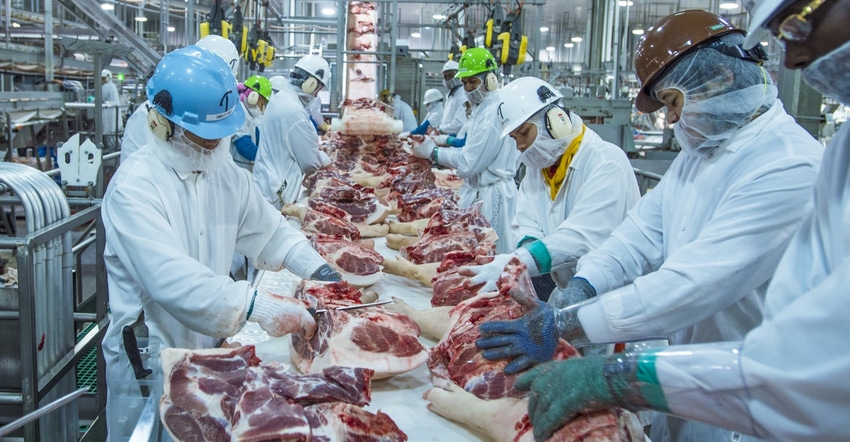
Earlier this spring, the U.S. District Court for the District of Minnesota vacated a portion of the Food Safety Inspection Services’ final rule establishing a voluntary New Swine Slaughter Inspection System. In a constituent update on May 26, USDA said establishments operating under NSIS should prepare to revert to a maximum line speed of 1,106 head per hour on June 30, 2021.
Iowa State University Economist Dermot Hayes conservatively estimates that the court ruling will cause a reduction in federal pork harvest capacity of 2.5%. Specific regions will experience significantly higher reduction in capacity.
Producers surrounding the six NSIS plants operating at line speeds of above 1,106 will be most negatively impacted. The NSIS plants will suffer from capacity reductions of 20-25% as those plants which participate in NSIS comprise nearly 25% of the country’s market hog processing capacity.
The Court found that FSIS violated the Administrative Procedure Act because it asked for comments on the impact of line speed increases on worker safety in the proposed rule but did not consider these comments in the final rule. The Court vacated the rule only insofar as it eliminated the maximum line speed cap for NSIS establishments. The other provisions of the final rule were not affected by the Court’s decision, FSIS noted in its constituent update.
Related: Court issues stay on hog slaughter inspection rule
Days before FSIS sent out its constituent update, the National Pork Producers Council released the economic impact analysis from Hayes if USDA reverted to slower line speeds at hog processing plants.
“NPPC is disappointed with the USDA’s decision to support a flawed federal district court decision to strike down line-speed provisions of the New Swine Inspection System that have been successfully evaluated and tested since the Clinton administration. Based on more than 20 years of development, NSIS line speeds have been proven to safely support much-needed pork processing capacity in the United States,” says Jim Monroe, NPPC assistant vice president, communications.
NSIS, initiated during the Clinton administration and evaluated at five pilot plants over 20 years, was approved for industry-wide adoption in 2019. NSIS modernized an inspection system that had remained unchanged for more than 50 years.
The origins of the increased line speeds allowed under NSIS are found in rulemaking progressing through the Clinton, Obama and Trump administrations. “The rule, formulated at the staff level, has no partisan history and its legal challenge was based on an alleged omission violating the Administrative Procedures Act. The ruling was not made due to evidence of a threat to worker safety – of which there is none,” Monroe notes.
Monroe explains the court ruling’s impact on hog farmers disproportionately impacts smaller producers, as harvest facilities are more incentivized to maintain relationships with larger producers who make up a higher percentage of their supply. Hayes estimates these producers will lose $10.70/cwt (per one hundred pounds).
Related: USDA asked to preserve faster hog processing speeds
“Should the resulting drop in hog prices create unprofitable conditions for these smaller producers, many multi-generational small farms may be forced into bankruptcy or a consolidation-driving sale of their farming operation,” he says.
Monroe notes coping with reduction in capacity is not as easy as driving down the road to the next plant. “Estimates show that long-haul hog deliveries can cost approximately $10/hog. When combined with the estimated $10.70/cwt reduction in price, many farmers will not be able to break even regardless of their success in finding a new buyer.”
Appeal possible
USDA told constituents to prepare for the slower speeds beginning at the end of June to meet the court-mandated requirement to take action within 90 days. USDA can still decide to appeal the decision.
“While the USDA has until the end of August 2021 to appeal the decision, irreparable harm will be exacted on small U.S. hog farmers when this court order goes into effect at the end of June 2021. NPPC will continue to pursue all avenues to reverse a court decision that will lead to pork industry consolidation and increased packer market power,” Monroe adds.
House Committee on Agriculture Ranking Member Glenn ‘GT’ Thompson, R-Pa., criticized USDA’s decision. In an April 26 letter, Republican House and Senate Agricultural leadership sought the administration to explore all possible options to avoid this outcome.
Some plants were financed and constructed around NSIS. Now these businesses face reverting to an inspection model that increases costs, results in lost efficiencies and likely means federal inspector shortages,” the Congressional letter notes.
“The pandemic made very clear the sensitive linkage between our nation’s food processing capacity and food security,” Thompson says. “While the Biden Administration has repeatedly asserted its commitment to addressing this vulnerability, USDA’s decision speaks otherwise.”
Thompson says the court’s decision offered USDA the opportunity to address minor technical deficiencies and reinforce an otherwise thoughtful and deliberative rulemaking that has taken decades to develop. “Instead, USDA chose a path that will most certainly result in an immediate and likely permanent reduction in our nation’s food production capacity, while simultaneously impacting our nation’s producers and consumers who are just beginning to recover from the pandemic.”
Read more about:
Meat ProcessingAbout the Author(s)
You May Also Like






